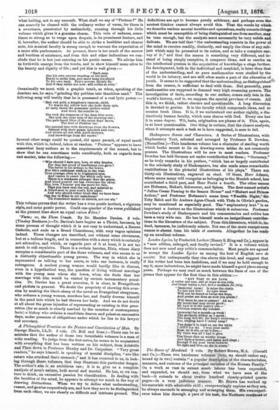Philosophical Treatise on the Nature and Constitution of Man. By
George Harris, LLD. 2 vols. (G. Bell and Sons.)--There can be no mistake that the author of these two formidable volumes is a man of wide reading. To judge from the foot-notes, he seems to be acquainted with everything that has been written on his subject, from Aristotle and Plato down to Professor Huxley and Dr. Carpenter. "Very great readers," he says himself, in speaking of mental discipline, "are like eaters who overload their stomach ;" and it has occurred to us, in look- ing through these volumes, that they illustrate this particular danger. The author's aim is an ambitious one ; it is to give us a complete analysis of man's nature, both moral and mental. He has, so we ven- ture to think, an excessive passion for classification. In dealing with the faculties of the mind, he appears to attempt too much in the way of drawing distinctions. When we try to define what understanding, reason, and genius respectively are, and how they are to be distinguished from each other, we are clearly on difficult and intricate ground. The definitions are apt to become purely arbitrary, and perhaps even the acntest thinker cannot always avoid this. That the words by which we describe various mental faculties and operations, really connote thine which must be susceptible of being distinguished one from another, may be true enough, but the analysis must necessarily be very subtle awl delicate. We are told that "the understanding consists in the power of the mind to receive readily, distinctly, and amply the ideas of any sub- ject which may be presented to its notice, and so take a complete sur- vey of it ;" and that the reason is something very different, and in- stead of being simply receptive, it compares ideas, and so carries on the intellectual process in the acquisition of knowledge a stage further. Its development, both in the individual and mankind, is later than that of the understanding, and so pure mathematics were studied by the world in its infancy, and are still often made a part of the education of youth. It seems to be suggested that the understanding, as distinguished from the reason, is sufficient to deal with them. But generally, pure mathematics are supposed to demand very high reasoning powers. The investigation of facts, according to our author, comes only late in the world's history, and is, we suppose, the special province of reason. All this is, we think, rather obscure and questionable. A long discussion is devoted to genius. It is the faculty which compounds ideas, and so creates fresh ideas. It is, if we understand our author rightly, a dis- tinctively human faculty, which man shares with God. Every one has it in some degree. Wit, taste, origination are phases of it. This, again, is at least questionable. One thing is certain, that the closest analysis, when it attempts such a task as is here suggested, is sure to fail.






























 Previous page
Previous page